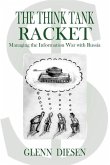The Trillion Dollar Silencer investigates the astounding lack of popular protest at the death and destruction that the military industrial complex is inflicting on people, nations, and the environment, and its budget-draining costs. Where is the antiwar protest by progressives, libertarians, environmentalists, civil rights advocates, academics, clergy, community volunteers, artists, et al? This book will focus on how military largesse infests such public sectors' interests. Contractors and bases serve as the economic hubs of their regions. State and local governments are intertwined with the DoD; some states have Military Departments. National Guard annual subsidies are large. Joint projects include aid to state environmental departments for restoration, and government-environmental organization teams to create buffer zones for bombing ranges. Economic development commissions aim to attract military industries and keep the existing bases and corporations. Veterans Administration hospitals are boons to their communities. Universities, colleges, and faculty get contracts and grants from the DoD and its agencies, such as the Defense Advanced Research Projects Agency. The Minerva Initiative. Reserve Officers' Training Corps programs are subsidized by the DoD. Civilian jobs in the DoD provide opportunities for scientists, engineers, policy analysts, and others. Every kind of business and nonprofit, including environmental and charitable organizations like The Nature Conservancy and Goodwill Industries feeds at the DoD trough via contracts and grants. Individuals, arts institutions, charities, churches, and universities succumb to the profitability of military-related investments. Pension funds of public and private employees are replete with military stocks. Philanthropy is another silencer. The DoD itself donates equipment to organizations, especially those of youth, and lends equipped battalions to Hollywood. The weapons firms give generously to the arts and charities, heavily to youth and minorities. They also initiate joint programs such as providing tutors and mentors for robotics teams in public schools. Our militarized economy is destructive and wasteful. How can we replace the multitude of dependencies on military funding and restore the boundary between it and civil society? Surely a first step is to see how military spending results in the complicity of civil society in its pernicious outcomes. That is what this book tries to reveal.
Bitte wählen Sie Ihr Anliegen aus.
Rechnungen
Retourenschein anfordern
Bestellstatus
Storno








